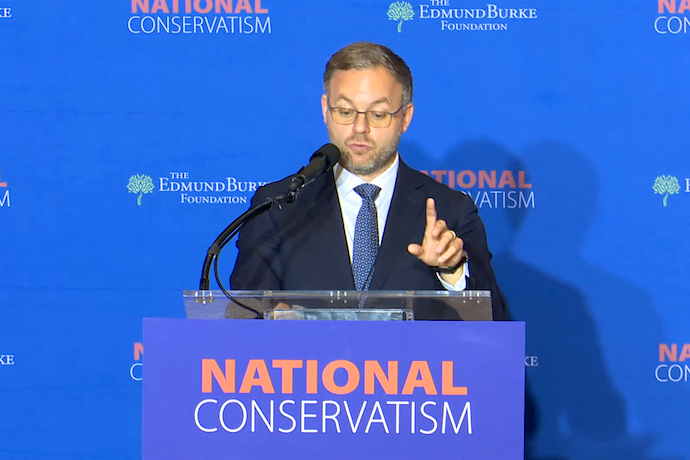No friends on the “other side of the aisle”—only enemies
In a morning panel of the second day of NatCon 2024, a group of Republican senators hammered home a confrontational message.
Sen. Jim DeMint: “There is no reasonable consensus between what we believe, and the ideology of the progressive Left. We have to beat them.”
Senator Ron Johnson: “It’s not our friend on the other side of the aisle, even though I wish it would be. It’s a real battle. The radical Left and progressive Democrats—same thing—are literally destroying this country. So our first task is, we need to fight and defeat them.”
Senator Mike Lee [claiming conservatives are being persecuted by ‘lawfare’]: “They’re trying to destroy our liberty. It’s not gonna stop at Bannon, Easton, Navarro and Trump—they’re coming after you. The senate should be a bulwark against this abuse of government power.”
Sticking with a central theme that, as Rachel Brovard put it on day one, “We are not part of the conservative movement—we are the conservative movement,” they attacked “establishment Republicans.” Mike Lee criticized “the top Democrat and Republican in each chamber” for having gotten too powerful and echoed the narrative Suella Braverman presented on the previous day: that the Tories lost their recent election because they “met progressives half-way”—an observation completely untethered from reality. “We’ve gotta stop assuming that you win elections and do better when we act more like Democrats. We don’t—that’s how we lose.”
To rousing applause, Lee closed out the panel by paraphrasing an old John Birch Society slogan: “We’re a constitutional republic, not a freakin’ democracy.”
Extremists have arrived in the mainstream
Next, Yoram Hazony introduced Albert Mohler and Doug Wilson as the “two great protestant leaders of our generation”—a statement that, at least in relation to Wilson, shows that fringe voices have moved into the mainstream.
Southern Baptist Theological Seminary president, Albert Mohler, among the more polished patriarchal authoritarians, recalls that when Roe v. Wade was overturned, “whatever commitment there was to the pro-life cause, was much less ontological than we had thought.” The conclusion to draw, he explains, is that conservatism must be grounded in a deeper “ontology”—another common theme of the conference. “A secular conservatism cannot meet the challenges of the day, and an accommodationist Christianity can do no better,” he argues.
Like many Christian nationalists, Mohler projects his longed-for “ontology” onto the foundations of the American order:
[The language that] we are endowed by our creator with unalienable rights [is]…not just decorative…behind that is the affirmation of a natural law…it is an order. behind that order is the god of Genesis.
Wilson, a deeply problematic figure, explained that supporters of the old conservative consensus of fusionism—the marriage of the religious and libertarian strains of conservatism—always believed the pursuit of virtue must only be individual, and that the state should only protect liberty in the public square. According to him this is insufficient; as “moral agents,” he declares, states should protect moral virtue.
To emphasize his point, Wilson, a slavery apologist who has thrown his support behind abusers, claimed:
[I]t used to be that the sexually troubled had to keep their kinks hidden away in the closet, but now the conservative Christian has to keep their virtues hidden in the recesses of the closet.
“Appeal to Heaven” jokes—with democracy as the punchline
Attempting to inject some levity into his remarks, Wilson joked about the recent revelation that an insurrection flag had been flown at Supreme Court justice Samuel Alito’s summer home:
We are making an appeal to heaven—excuse me, is that phrase ok?
His quip was met with rousing applause. If virtue is only private, Wilson reasons, perhaps Alito’s wife, “should have only flown that phrase in the flagpole of her heart—but hearts don’t have flagpoles, only the public square does…if we dont fly the appeal to heaven flag,” he said, using a slur for transgender people, “we’ll fly the t****y flag.”
Wilson closed with a recommendation that, if he wins the 2024 election, Donald Trump should, on inauguration day:
[G]ive explicit glory to the God of heaven, and do it in the name of Jesus Christ our Lord.
Only a “Protestant majority” can usher in “restoration”
NatCon organizer Yoram Hazony, a Modern Orthodox Jew, called for “Protestant unity in the face of these hard times,” and repeatedly emphasized that everyone concerned about “restoration” in America knows it has to come through the Protestant majority:
Catholics and Jews can help in all sorts of ways, but without protestantism it’s just not going to happen.
Wilson responded to Hazony’s call for an end to Protestant infighting with a warning that, while Protestant denominations work together on small initiatives such as soup kitchens, there’s a sinister side in that this cooperation: “that turns into liberalism.”
To Wilson’s questions, “what is the difference between an ally and a co-belligerent?” and what are our shared goals, “not just pragmatically but theologically?” Mohler responds by asserting that, among young Protestants, there is “more commonality than you might think.” Listeners applaud.
What happens to religious minorities in a Christian state?
When asked in closing by Hazony whether there will be room for Jews, Hindus, or other religious minorities in their desired Christian state where the “Christian commitments will be maximalized,” Wilson responds somewhat cryptically: “Jews in this ideal Republic would be more welcome than they currently are here.”
Mohler (again, the more polished of the two) replies:
[…] enthusiastically so…among my tribe so to speak, theologically, it would be an absolute divine responsibility to be fully respectful of Jews, fully integrated into the entire project.
Regarding Hindus, Muslims and other minorities, however, Mohler stresses that the Christian state would be grounded in theology that others would have to respect. Not only is the contrast notable, but one also wonders exactly which Jews will be respected and what he means by “fully integrated.”
Country Club Republican optics—MAGA policies
The afternoon saw a thematic shift to foreign policy and the role of state power.
First up is Elbridge “Bridge” Colby, a Trump official and remnant of the old guard of Country Club Republicans amidst NatCon’s wild mix of Twitter trolls, brash right-wing populists, fundamentalist preachers and theocrats. Despite the stereotypical DC “Insider” look, with his blond coiffure and navy blue suit, Ivy League education, and legacy status (his Grandfather was the head of the CIA), Colby was one of the voices who, during the Trump administration, set out to overhaul decades of established Republican foreign policy, shifting America’s focus from Russia to China.
As Politico reported in 2023, he was an influential voice among those reluctant to support Ukraine against Russia’s invasion. Colby and his Allies frame themselves as “conservative realists,” which he’s trying to sell as the “middle way” between isolationism and interventionism.
Battle against the “totalitarian” “group quota regime”
A contrast to Colby in both style and method Tom Klingenstein, Chairman of the Claremont Institute, confirmed that the California-based conservative think tank has indeed become the intellectual smokescreen of the MAGA movement. Klingenstein derides Republicans who fail to realize that “we are in a war against an enemy that says we are systemically racist and so we must be destroyed.”
Referring to that enemy as “the woke or group quota regime,” (his term for those who support DEI and affirmative action policies), he believes that “Like any revolutionary regime, the group, the quota regime must destroy the American way of life.”
In a time of war, Klingenstein boomed, the time for talk is over:
War is not a battle of arguments!
Incidentally, “a battle of arguments” is a decent description of a democratic society.
The “coup against Trump”—no evidence needed.
Klingenstein, who believes “[the] current regime is similar but not identical to totalitarian regimes of the 21st century,” claims that while there was a “coup” against president Trump there’s no need to prove it, because time is running out:
Can we prove in microscopic detail that it was a coup? No. But we are beyond proving time.
Republicans should “stop arguing and start insisting,” as Klingenstein put it, that outcome differences between groups rarely have anything to do with racism, “Whites are not racist and Whites do not have privileges.” The whole point of “the group quota regime” is “to destroy us…i can’t assume the woke radicals will try to kill all Whites directly—indirectly is good enough.”
“American Whites” are “victims of a cultural genocide” by the “anti-White regime”
During a panel on how to “survive late liberalism,” Jeremy Carl, a Senior Fellow at the Claremont Institute and former Trump official, touted the right-wing “White Replacement” conspiracy theory, claiming that the “anti-White regime manifests in dozens of areas […] education, crime, real estate, immigration, health care, military, the church.”
Later, claiming that Whites are victims of a cultural genocide in the US, he proposes aggressive action:
There’s some questions on our side of the aisle as to whether we should use civil rights law or fundamentally reform it. And I think the answer is both. We both need to use it right now for really aggressive lawfare, my friends.
“It’s OK to be White”
Stressing that he hoped there were “leftist journalists” in the room, “scribbling my unforgivable hate speech in their books”—a remark that earned him chuckles from the audience—Carl says that his book, The Unprotected Class: How Anti-White Racism Is Tearing America Apart, was originally supposed to be called “It’s Okay to Be White,” but that his publisher’s sales staff eventually convinced him to rename the book because, they told him, “we’re not going to be able to sell that into Costco and Barnes and Noble with that title.” He laments:
If I had a book that was entitled It’s Okay to Be Hispanic, or to Be Black, or It’s Okay to Be An American, nobody would look twice. But if I say ‘it’s okay to be White,’ I might as well just put on my KKK hood right now, right?
Indeed, “It’s OK to be White” has been a right-wing, White nationalist slogan embraced by neo-Nazis since 2017.
“I talked to Trump twice today!”
For the evening session, Marco Rubio had been announced to give a keynote—but, as many attendees had already noticed, Rubio changed his dinner plans and skipped NatCon to attend the evening’s Trump rally in Miami in the hope that he’ll be tapped to be VP. Instead, Vivek Ramaswamy waxed on about the values of “national libertarianism.”
Ramaswamy, maybe to show that he, too, is still in Trump’s good graces, opens by bragging that he talked to Trump twice today, before discussing his plan to dismantle “the regulatory state,” nationalist protectionism, and how to usher in a “national revival.” Ramaswamy derided what he called the “neoliberal consensus that all immigration is good”; railed against “rogue conservative agencies like the Consumer Financial Protection Bureau” (which he believes should be shut down, just like the Department of Education); and called for an end to birthright citizenship for the children of undocumented immigrants—all to loud applause. If Trump is keeping tabs on NatCon he may indeed be impressed by Ramaswamy’s adoption of these Project 2025 staples.
Perspectives From Abroad
India: “God, religion, tradition, family, patriotism, nationalism”
Ram Madhav, President of the India Foundation (IF), former BJP official, and a member of the Rashtriya Swayamsevak Sangh (RSS), a volunteer paramilitary organization associated with the BJP, professed his huge respect for NatCon. Madhav said Hindu nationalists like him were at NatCon because they hold the same values of “God, religion, tradition, family, patriotism, nationalism.”
But, he proclaimed to loud applause, “We came here to tell you about the success story of conservatism in india—the defeat of the left liberal marxist radical Islamist cabal in India.”
Perhaps sensitive to the significant religious differences between Hinduism and the ‘Judeo-Christian’ traditions championed at NatCon, Madhav suggested that his movement’s goal was not for “theocracy” but for a “restoration of India’s cultural-civilizational glory,” similar to the Ten Commandments and aligned with national conservatism.
Celebrating the “restoration” of the Ram Mandir temple in India—a landmark effort of the Hindu nationalist movement, built in the former spot of the Babri Masjid mosque razed by mobs in 1992—Madhav compared it to the longed-for restoration of King David’s Temple in Jerusalem, an idea championed by portions of the far-right Jewish and Christian Zionist movements today.
Hungary: Against “liberal hegemony”
Like so many others, Balázs Orbán, political advisor to Hungary’s authoritarian Prime Minister Viktor Orbán (no relation), as well as the current chairman of Mathias Corvinus Collegium (MCC), Prime Minister Orbán’s crony factory, draws chuckles from the audience by framing NatCon in Brussels as a heroic resistance operation against state oppression enacted by the police.
Seeking to draw a parallel between 20th century communism and post-Cold War liberalism, Orbán claims that both are totalizing ideologies of progress. Railing against “globalist” and “imperialist” efforts he warns:
We national conservatives must recognize that liberals have a specific political goal. Since they failed to organize the world according to the neoliberal western model, they are using this narrative to maintain their hegemony in the western world…we cannot accept the liberal narrative of this grand strategy.
Then, charging that “many of the problems we see in the world today” have been created by liberals since the 1990s, he proposes that the future will be “the era of sovereignty” where every nation has the right to “dictate its goals and define its path… [that] differences in worldviews” are “not a bug but a feature.” Multiple centers of power will emerge in this world but they are not “expansive” and will not seek to “destroy one another.”
“Many people criticize my president for his peace mission,” Balázs Orbán laments, referring to Viktor Orbán’s first action as President of the Council of the European Union: meeting Russia’s Vladimir Putin and Ukrainian president Volodymyr Zelensky. In most European countries it was understood as a show of solidarity with Russia, and an affront to the European commitment to help Ukraine in their defense against invasion.
UK: “Gangstery” in the EU
It isn’t quite clear why James Orr, Associate Professor of Philosophy of Religion at Cambridge University, spoke as an expert on foreign policy and NATO at an afternoon panel titled “Future of Europe.” Speaking to a standing-room-only crowd and calling himself a “Brexiteer,” Orr claims that the European Union has left behind what he refers to as Charles de Gaulle’s “family of fatherlands” (the correct quote would’ve been “Europe of fatherlands”) in favor of a system that, he claims, disrespects national sovereignty.
He defended a law passed by Hungary’s parliament which, in Orr’s view, “banned gender ideology” in schools (the law, in fact, banned LGBTQ content in schools). Finally he recalled the words of Mark Rutte, then-President of the European Council, that in passing this law, Hungary had “no place in the EU anymore,” which Orr referred to as “gangstery,” and claimed that the UK could only regain its “sovereignty” by withdrawing from the European Convention on Human Rights.
France: Blackwell, Viguerie and the “Goldwater Boys” as model strategists for the international Right
Alexandre Pesey is the embodiment of the fact that global networking between right-wingers has been going on for decades. After training at Morton Blackwell’s Leadership Institute he founded the Institut de Formation Politique (IFP), which has since gained notoriety as a “finishing school educating the far-right leaders of tomorrow.” The Frenchman cites Richard Viguerie and Paul Weyrich, the “Goldwater Boys” and architects of the political infrastructure of the modern Christian and Political Right as the strategists whose tactics he looked to and copied when building what he calls “a conservative revolution” in France.
He recalls that it was necessary to have “wealthy businessmen” willing to buy media outlets to build a right-wing media landscape from scratch, which had happened successfully in France—and thanks American conservatives for providing him with the strategies to create a conservative political infrastructure in France, modeled after the one in the US.





